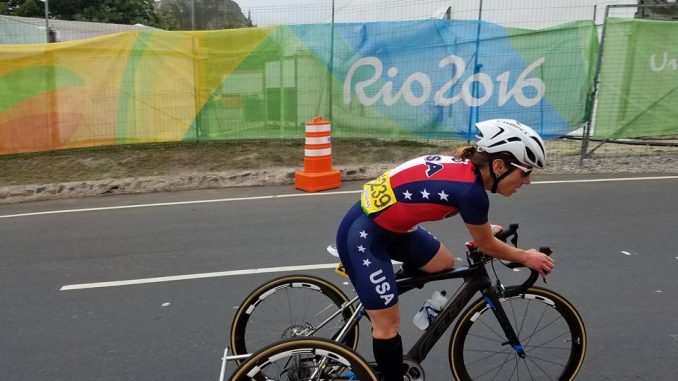
SUNY alumna Jill Walsh has fallen down and continued to get back up, regardless of any obstacles that come her way.
After winning two silver medals in the cycling road women’s time trial and road race (T1-T2) during her first Paralympics last month in Rio, Walsh made a visit to the White House last week.
“It was like an out-of-body experience,” the 53-year-old Syracuse resident said. “You have to go through these different areas and then you can see the room where you’re going to walk through, and there was President Obama, Michelle and [Vice President] Joe Biden. I almost lost my breath before I walked into the room. I said to myself ‘I can’t believe I’m going to meet the President of the United States.’”
Walsh shared in a hug with Michelle Obama, and received another from Biden, after informing him about their connection to Syracuse.
“It was pretty amazing,” Walsh said.
But the road to Rio did not come easy for the retired New York state trooper. Since being diagnosed with multiple sclerosis (MS) in 2010, Walsh, an avid runner and triathlete, including a finish in the 2012 Ironman, took a different route to keeping her competitive spirit alive, and began cycling.
“I’ve always been active my whole life, I wouldn’t know how to not be active,” Walsh said. “It wasn’t even an issue really if I was going to continue doing something, it just was a matter of ‘ok, how am I going to continue doing it?”
But in 2013, Walsh experienced hardship. On a charity ride from San Francisco to San Diego for the Challenged Athletes Foundation, Walsh’s balance started becoming more affected by the progressive disease. Throughout the ride, Walsh stopped frequently and hit the ground repeatedly. That would be her last major ride on a two-wheeled bike.
While on the trail, Walsh spotted Steven Peace, a 2012 U.S Paralympic cyclist, riding a three-wheeler. Compared to a regular bike, she learned a road trike has the rear wheel removed and a conversion axle in place to provide stability — which addressed her balance issues and brought a new desire to continue cycling.
“I would have never considered it had I not seen it,” Walsh said. “If someone would have said, ‘do you want to ride an adult tricycle?’ I would have said “no way.””
Walsh suffers from bilateral foot drop, the inability to bring her foot up and down or have ankle control. At the bottom portion of her feet, she wears customized braces. For those with disabilities and injuries, athletic gear is not covered by health insurance, she said.
After a month of dejection and battling the effects of MS, Walsh took a chance, sending an email inquiry to Peace about the newly-spotted bike. Peace negotiated to only loan Walsh the bike if she raced it. The mother of three obliged, competing with the vehicle that would change her life, winning the U.S. Para-Cycling National Championship in Madison, Wisconsin in 2014.
As a result of her impressive times in Madison, Walsh proved she was fast enough to be competitive internationally and was selected for the U.S. Paralympics Cycling National Team. At the 2014 UCI Para-Cycling World Championships in Greenville, South Carolina she earned a silver medal in the road race and a bronze in the time trial.
Last summer was a whirlwind for Walsh, who traveled around the world riding for Team USA. This year, she was chosen for the U.S. Paralympics Team. Accompanying her to Rio were family members including her husband, Greg, daughter, Julia, sister, and niece, Alee Desiderio, a SUNY New Paltz alumna (‘15).
Through her time in the SUNY system, Walsh attended SUNY Institute of Technology ‘84 (now SUNY Polytechnic Institute), and SUNY Binghamton ’85 for graduate school.
At the Paralympics, Walsh took part in the Opening Ceremonies, an event that greatly struck the reigning Para-Cycling Road World Champion.
“I didn’t know how much it was going to affect me until I was walking in with Team USA and the whole stadium was completely full,” Walsh said. “I don’t even have words to describe that feeling walking in with Team USA into the Paralympic Opening Ceremonies. I’ll remember that my whole life.”
On the world’s biggest stage, Walsh told herself that racing is nothing more than what she normally does.
“I tried to make it not too big so it didn’t overwhelm me, because I kind of get very nervous, and so I tried to tell myself ‘you’ve done this before, you’ve done all the work, all you have to do is get to that start line and do what you know how to do,’” she said.
Walsh did just that as she competed in the T2 Paralympic cycling classification for athletes with balance issues who race on three wheels. She completed the time trial, and with a T1 rider still to finish the 15-kilometer course and a factor-system in play, Walsh watched with anticipation, awaiting the standings to display on the scoreboard. Her opponent reached the finish line, the factor was calculated, and soon after discovered she secured the silver medal.
“It was pretty amazing to be standing on the podium with a Team USA uniform on,” Walsh said. “I can’t even describe how that feels.”
As an athlete who did not compete in a Paralympic event until 2014, Walsh has overcome the odds on the path to becoming a Paralympic medalist.
And she advises those in difficult situations to continue to reach for their goals, despite any roadblocks that occur.
“Just be willing to take a chance,” Walsh said. “I was willing to take a chance, and I was willing to take a chance to go to nationals. Just be willing to try something, and if it stops working, find a different way, if that’s what you want to do.”
